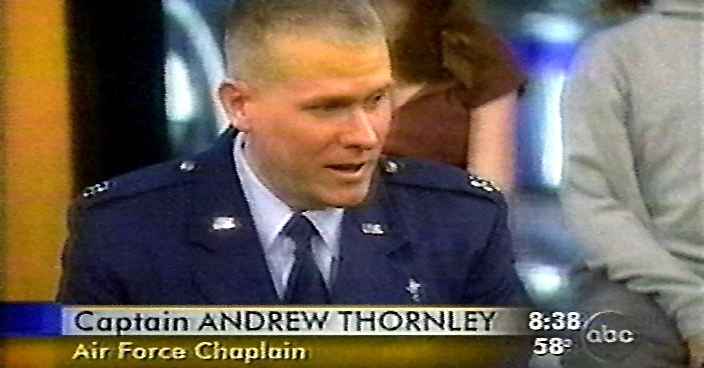Air Force Cop Now Serves God and Country
 Major Andrew Thornley spent four years as an Airman in the Security Forces — a beginning to a career in which he said he had difficulty finding a “spiritual mentor.” That challenge was something he would ultimately seek to help others overcome:
Major Andrew Thornley spent four years as an Airman in the Security Forces — a beginning to a career in which he said he had difficulty finding a “spiritual mentor.” That challenge was something he would ultimately seek to help others overcome:
After completing his enlistment, Thornley began his theological studies, eventually becoming a pastor in the civilian world. After 10 years as a pastor, he began to feel that there might be more he could do with his newfound knowledge…
“I left the Air Force, but the Air Force never really left me,” Thornley said. “I’ve always had the blue blood running through my veins.”
Chaplain Thornley re-entered the Air Force in October 2001 and spent the next several years trying to help troops and their families cope with the hardships of war.
In 2003 he was featured on Good Morning America, where he answered questions from GMA host Charles Gibson and a panel of children about the unique challenges to the military family during a time of war:
7-year-old Cynthia Bensberg’s question [was] “Why do we have to go to war?”…
 In a Baptist Press interview a week later, Chaplain Thornley reiterated the long-known belief that military service — and especially war — have the natural effect of driving people to consider their eternal state (which ultimately leads to the cliché that “there are no atheists in foxholes”).
In a Baptist Press interview a week later, Chaplain Thornley reiterated the long-known belief that military service — and especially war — have the natural effect of driving people to consider their eternal state (which ultimately leads to the cliché that “there are no atheists in foxholes”).
“My primary purpose for being a chaplain is to fulfill the Great Commission,” he said. “This is, in my mind, one of the best-kept secrets about doing ministry in America — that is, the mission field of the military…Indeed the fields are ripe for harvest.”
And according to ABC, an increasing number of soldiers are coming to appreciate the ministry of military chaplains as the war intensifies. With reports of U.S troops being baptized in the Kuwaiti desert and military churches overflowing, chaplains say the dangers of military conflict are driving soldiers to contemplate their spiritual condition.
Stephanie Walker, a soldier serving in Iraq, told ABC that the war has made her think about her relationship with God more seriously than she has in years. “I get a little nervous out here and think, ‘Maybe I should get things straight,'” Walker said.
Today, Chaplain Thornley is a Wing Chaplain at Yokota Air Base, Japan, where he’s supporting the Air Force’s concept of “spiritual fitness” for all Airman. While Michael “Mikey” Weinstein is making an empty threat to sue the US Marine Corps over its decision to emphasize “spiritual fitness,” Chaplain Thornley considers spiritual fitness to be the most crucial of the four areas the Air Force emphasizes to encourage whole-person health:
Chaplains promote the free exercise of religion in the military while also working to strengthen the spiritual pillar of Comprehensive Airman Fitness…
Thornley said. “Every person has a spiritual component. If they don’t pay attention to that, it could harm them in some way.”
Chaplain Thornley is correct. Every person has a spiritual component — whether they acknowledge it or not. The US military tries to provide — and sometimes does an admirable job of providing — the resources they need to support that spiritual component (despite the attacks of Mikey Weinstein).
Chaplain Thornley is also correct that every place a Christian goes is a “mission field.” This concept has been discussed many times before; a Christian should serve God in whatever role God has placed him, whether garbage man or military general. A Christian’s witness does not end because of where he is — his witness is because of where he is.
For military Christians, we are ambassadors for Christ in uniform.
ADVERTISEMENT
Mikey Weinstinen is a sadistic, self-centered individual who,is unhappy with his life, and himself,and his lack of motivation, as well as an egomaniac. He has no heart, no soul
Thornley should be court martialed and discharged. The mission of military chaplains is NOT to HARVEST THE SHEEP. Does he think he is the “Pied Piper?”
@Generic Soldier
It is notable that you are demanding the court-martial of a chaplain for doing nothing more than expressing a thought (one consistent with his constitutionally-protected religious beliefs, by the way). Which article of the UCMJ calls out thought-crimes again?
Your religious intolerance is showing.